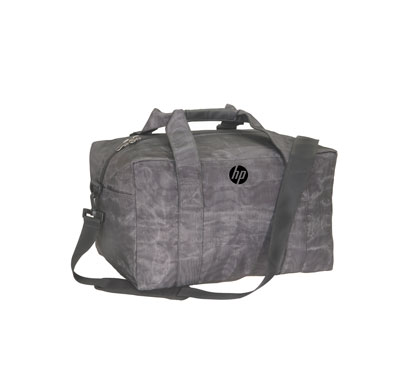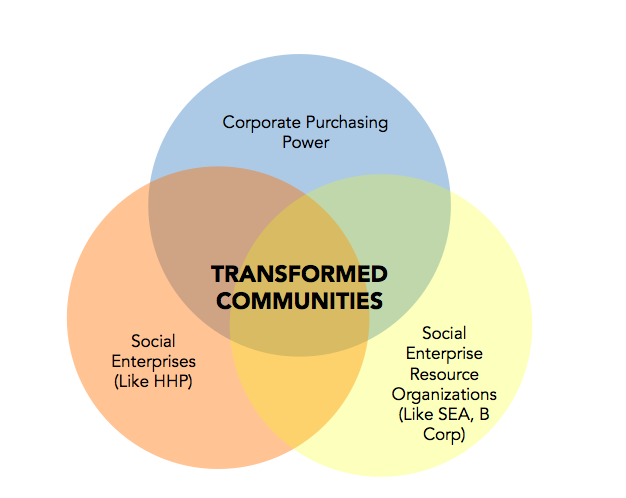EXECUTIVE SUMMARY
HHP was created to connect the purchasing power of corporations with social enterprises. HHP identifies and forges working partnerships with social enterprises in the U.S. and around the world that share a common goal: to help people improve their lives and become self-sufficient. HHP focuses on the multi-billion-dollar market for promotional products, incentives, employee recognition, and consumer loyalty programs. By giving companies and organizations socially responsible options, HHP offers them a way to demonstrate their social values and integrity in a climate where this is increasingly important.
THE PROBLEM
HHP’s challenge is to connect corporations with social enterprises.
Corporate social responsibility (CSR) is both a moral imperative and a source of opportunity -- it helps the world but also allows companies to differentiate themselves in an already crowded marketplace. When a company practices CSR they engage their customers, increase sales, and attract and motivate their employees.
Corporations are always looking to demonstrate to consumers, investors, and employees that they embrace CSR as a core value. However, many companies are unaware of practical initiatives beyond environmental sustainability that embrace and demonstrate CSR.
Social purpose enterprises around the world are struggling in their need to generate more revenue to create sustainable livelihoods and maintain the valuable social programming they offer. Some social enterprises, including HHP, provide services and/or products to corporations. It seems logical that corporations would also embrace purchasing products and services from social enterprises as another CSR initiative. However, there are significant barriers to this connection:
The first barrier is knowledge that social enterprises exist as sources for products and services.
The second barrier is engaging corporate decision makers to purchase from social enterprises.

THE SOLUTION
Leverage Your Contacts and Make Personal Connections
Millions of Americans volunteer, including some of the people at corporations that are making or influencing the decision to do business with you. These individuals give up their time to help others who are less fortunate. They have empathy for others and could become your champions within their corporations. Engage with your contacts about their volunteer activities. It’s easier to find common ground if their activities relate to your mission and they will likely identify with your mission and embrace what you do.
For example, HHP helps Lambs Farm, a campus for developmentally disadvantaged adults, sell their cookies and candies made by these adults to corporations through resellers already servicing corporations. Initially, HHP was unsuccessful at selling to a particular reseller for a couple of years until its Executive Vice President stopped by the HHP booth at a trade show. The sales manager from Lambs Farm engaged him in a conversation and learned that his son is developmentally disadvantaged. He embraced the mission and directed his buyer to offer an assortment of HHP products to their customers.
Make Sure Your Products or Services are as Great as Your Mission


A great mission is not enough. It is essential to sell exceptional products and provide outstanding services. You hurt all social enterprises if you think that you can sell a mediocre product even with a truly special mission. Social enterprise managers are responsible for producing great products even when they employ transitional workers.
Consider Selling Through Resellers
Oftentimes, the only channel of distribution a social enterprise is aware of is selling directly to the consumer. However, it may be more efficient and profitable to sell to resellers, even though margins are lower. For this reason, be sure you understand how to price your product or service to successfully penetrate multiple channels of distribution.
HHP services its markets -- promotional products, incentive, employee recognition, and business gifts -- through resellers that are already servicing decision makers at numerous corporations. Because they have established relationships, their company is already set up as a resource with the various procurement departments. It is costly for a large corporation to set up a new supplier. Utilizing an established resource overcomes this obstacle. Additionally, your reseller is selling to multiple existing accounts; something that would cost you time and marketing dollars to do on your own.
The reseller’s salesperson may not have the same level of passion, commitment, and product knowledge that you do. But if the reseller’s salesperson embraces your mission, they become a champion and an effective representative of your organization.
Focus on your Champions
Find your champions in an organization and let them be your biggest evangelist. They will have greater access to multiple potential buyers and their enthusiasm will be a bigger draw for their associates than yours.
It takes resources to support your customers. Initially HHP responded to a very large number of quote requests but our conversion rate was very low. Now we are transitioning to providing additional support to our champions. They, in turn, are increasing the number of quotes they submit and our conversion rate with them is much higher.
After years of trying to get a reseller’s business, we found a champion within their organization. Her enthusiasm and work on our behalf has now lead this reseller to become our second biggest customer.
Partner with Likeminded Entities
B Corps are for-profit companies that meet rigorous standards of social and environmental performance, accountability, and transparency. Businesses achieve B Corp certification if they score 80 out of 200 in their assessment tool. The criteria include:
- Under Community/Suppliers & distributors, “What % of materials or products purchased have third party social or environmental certification or approval, or are from Significant Suppliers that are purpose driven or have third party company level certification or approval?”
- Under Community/Supply Chain Poverty alleviation, “Does your company source from and/or provide support to populations of low income, poor, or very poor markets through your supply chain purchasing practices?”
Currently, the assessment tool does not include criteria referencing whether a company purchases from social enterprises. Adding this information would help create a conscious and purposeful shift toward more corporations using their purchasing power for good. Currently there are 2,064 B Corporations. Since they must re-certify through the updated assessment tools every two years, adding information about social enterprises within the tool would be impactful.
Another similarly focused organization is the Social Enterprise Alliance (SEA). This membership organization provides social enterprises with resources to grow social entrepreneurship on a national scale and serve as a voice for more sustainable social impact.
More Powerful Together

HHP identifies and forges working partnerships with social enterprises in the U.S. and around the world with a common goal of improving lives. The HHP model focuses on the multi-billion-dollar market for promotional products, incentives, employee recognition and consumer loyalty programs. By giving companies and organizations socially responsible options, HHP offers them a way to demonstrate their social values and integrity in a climate where this is increasingly important.
This is what we’re able to accomplish on our own, but joining forces with similarly focused organizations would be even more powerful. Organizations like B Corp and SEA serve as wonderful resources for their members. Imagine the impact they could make if they acted as a directory that any corporation could access if they are looking for social enterprises with whom to do business? Giving all companies and organizations socially responsible options enables them to demonstrate social values and integrity in a climate where this is increasingly important.
Bios

Michael Arkes, President & Founder
Mike founded HHP in January of 2007 and serves as its President. For 42 years, he worked for his family’s business, Hinda Incentives, serving as the company leader for 26 of those years. In October 2012, Hinda Incentives was sold, and Michael devotes his energies to developing new business opportunities for HHP.
Dena Hirschberg, Executive Vice President
At HHP, Dena leads all divisions of the organization. In addition to implementing HHP’s overall strategic plan, she manages team members in all aspects of the business including business development and sales; marketing and brand management, including that of our two social enterprise brands, 1eleven™ and Helping Hand Artisans™; operations; and, new product development for all of HHP’s channels of distribution. She is co-founder of an award-winning specialty market toy company and owner of a consulting firm specializing in strategic innovation and new product development.



